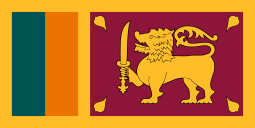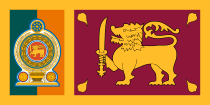Flag of Sri Lanka
 |
|
| Name | Lion flag or Sinha flag |
|---|---|
| Use | Civil and state flag, civil ensign |
| Proportion | 1:2 |
| Adopted | 22 May 1972 |
| Design | Dark red rectangular panel bordered yellow containing a yellow lion holding a sword upright in its right fore paw, and four bo leaves, one in each corner, and next to the hoist two vertical stripes, green and orange, also bordered yellow together. |

Variant flag of Sri Lanka
|
|
| Use | Civil ensign |
| Proportion | 1:2 |
| Adopted | 1972 |
| Design | A red field with the flag of Sri Lanka in the canton. |

Variant flag of Sri Lanka
|
|
| Use | Blue ensign |
| Proportion | 1:2 |
| Adopted | 1972 |
| Design | A blue field with the flag of Sri Lanka in the canton. |

Variant flag of Sri Lanka
|
|
| Use | President's Colour |
| Proportion | 1:2 |
| Adopted | 1972 |
| Design | A defaced flag of Sri Lanka with Coat of arms of Sri Lanka |

Variant flag of Sri Lanka
|
|
| Use | Naval ensign |
| Proportion | 1:2 |
| Adopted | 1972 |
| Design | A white field with the flag of Sri Lanka in the canton. |

Variant flag of Sri Lanka
|
|
| Use | Air Force ensign |
| Proportion | 1:2 |
| Adopted | 2010 |
| Design | A defaced sky blue ensign with the flag of Sri Lanka in the canton and Air Force roundel. |
The flag of Sri Lanka (Sinhala: ශ්රී ලංකාවේ ජාතික කොඩිය Sri Lankavay Jathika Kodiya), also called the Lion flag or Sinha flag, consists of a yellow lion holding a kastane sword in its right fore paw in a dark red background with four yellow bo leaves in each corner of the background. Around the background is a yellow border and to its left are two vertical stripes of equal size in green and saffron, with the saffron stripe closest to the lion. The lion represents bravery of Sri Lankans. The four Bo leaves represent four main concepts of Buddhism Mettā, Karuna, Mudita and Upekkha. The stripes represent the two main minority groups. The saffron stripe represents Tamils and the green stripe represents Muslims, and the maroon background represents the majority Sinhalese. The yellow border around the flag represents the unity of Sri Lankans.
It was adopted in 1950 following the recommendations of a committee appointed by the 1st Prime Minister of Ceylon, The Rt Hon D.S. Senanayake.
When Vijaya, the first King of Sri Lanka, arrived in Sri Lanka from India in 486 BC, he brought with him a flag with a symbol of a lion on it. Since then the Lion symbol played a significant role in the history of Sri Lanka. It was used extensively by North Indian prince who followed King Vijaya and it became a symbol of freedom and hope. In 162 BC, when King Dutugemunu embarked on the campaign in which he defeated the South Indian invader Elara, who had ruled the northern part of the island, he carried with him a banner which portrayed a lion carrying a sword on his right forepaw along with two other symbols, the Sun and the Moon.
...
Wikipedia
